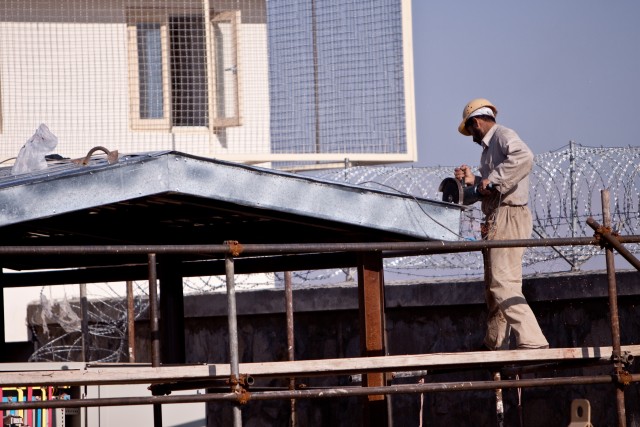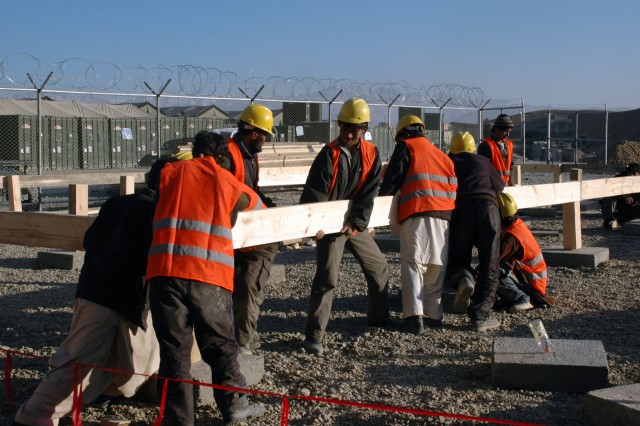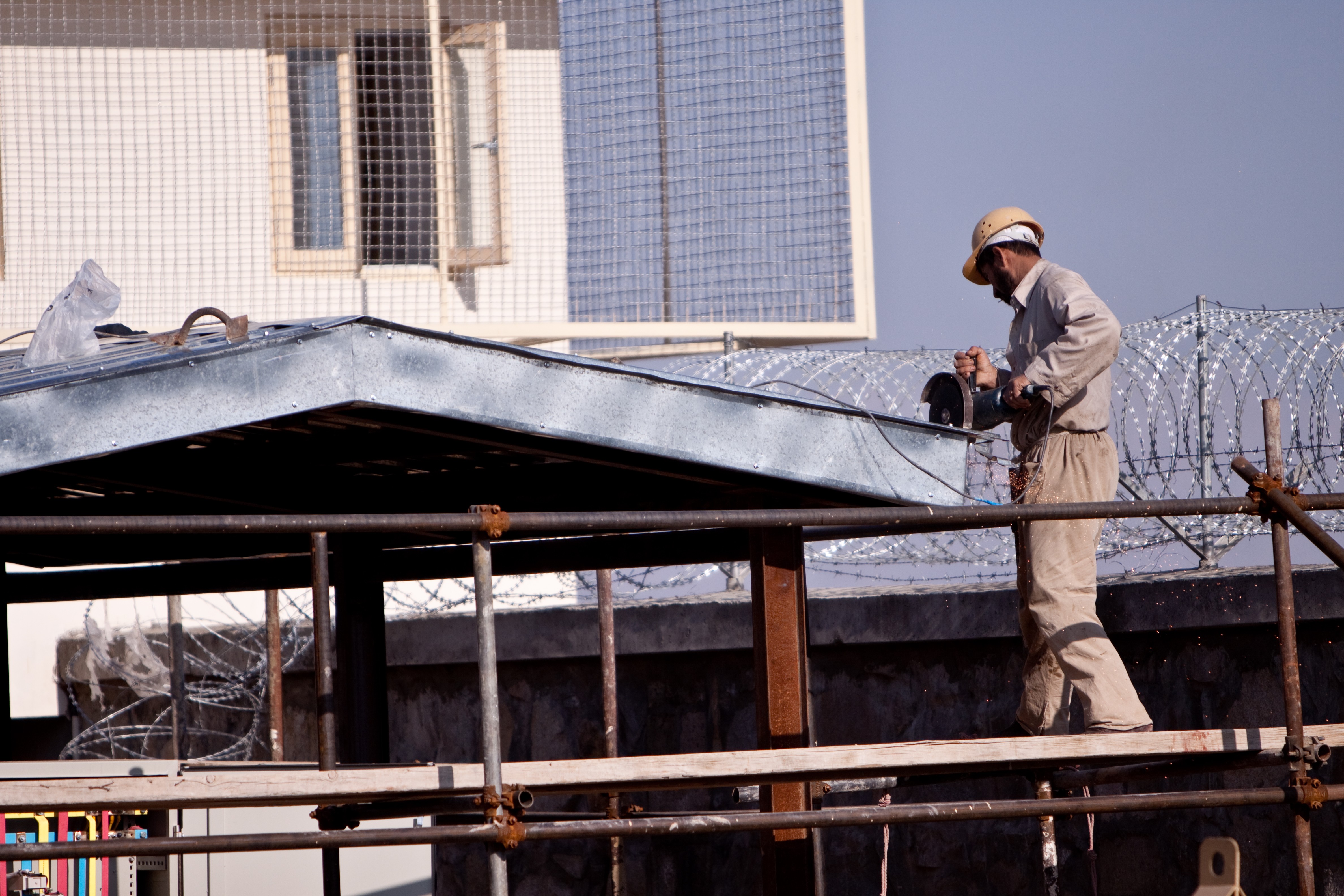KABUL, Afghanistan - The U.S. Army Corps of Engineers has rolled out a new policy to ensure Afghan contractors pay their Afghan construction workers for labor associated with U.S.-funded construction projects.
All new contracts awarded by the Afghanistan Engineer District-North in Kabul will contain provisions that require contractors to prove they are paying their employees, sub-contractors and suppliers.
The intent is to prevent Afghan and other foreign contractors from skimming wages or simply not paying workers and suppliers, a widespread practice in a country marred by corruption.
"We're trying to find ways to enforce payment to these individuals," said Darrel Johnson, the chief of contracting for AED-N. "We're here to win the hearts and minds of these folks. We've got to win that battle."
The initiative will be in effect for more than 300 contracts for developments, with a combined value exceeding $3.2 billion in fiscal 2010 alone. The work includes Afghanistan National Police stations, Afghanistan National Army complexes, roads, dams, and other infrastructure projects across the country.
The matter is important because Afghan workers often mistakenly blame U.S. officials when their Afghan employers withhold wages for weeks or even months, Johnson said.
"They're upset at the American government because they think we didn't pay them," he said. "That's what started these initiatives - to try to enforce the payment of the subcontractors and the suppliers and the employees of these contractors."
The initiative bolsters the Corps' zero-tolerance posture toward fraud, said Col. Michael McCormick, AED-N commander, who oversees operations in northern Afghanistan.
"Workers not being paid for the work that they do is a form of corruption," he said. "We will take whatever measures we can to help counter any form of corruption with our contracts and our projects."
In addition, Corps officials expect the policy will reduce labor disputes that have led to work stoppages.
For instance, construction came to a halt for nearly a month on an Afghan National Police district headquarters building in a remote area near the northern city of Mazar-e-Sharif because of pay issues. Workers walked off the site Nov. 1, complaining that their Afghan employers hadn't paid them for three months, according to an initial investigation by Corps officials.
U.S. officials visited the location, and by Nov. 25 had negotiated an agreement with the Afghan contractor to provide the workers their back pay, said Tyrone Crear, area engineer in the Corps' Mazari-i-Sharif Area Office. The workers agreed to return to the project after the Eid Al-Adha holiday in late November.
All new contracts issued by the Corps mandate that Afghan and foreign contractors specify procedures to make prompt payment to subcontractors, workers and suppliers. Furthermore, contractors are required to make payroll records available to U.S. officials for inspection. In addition, they must allow U.S. officials or their representatives to survey workers on construction sites to verify the workers' pay status.
The new policy falls within Afghan labor law, said Dale Holmes, district counsel for the Corps in Kabul.
Afghan law requires employers to pay their employees within 30 days of work performed, but government enforcement efforts are weak and contractors too often ignore the law, Holmes said. Exact figures are unavailable, but U.S. officials believe nonpayment issues arose at as many as 25 percent of Corps projects before the initiative was launched in late November.
The owner of an Afghan contracting company that provides construction inspection services to the Corps believes nonpayment is a frequent issue.
"It happens most of the time on the projects," the contractor said. "Our people have heard this when they are on sites. We have heard this too many times."
Sometimes, contractors withhold wages on U.S.-funded projects to cover expenses at other projects, he said. Other times, they withhold wages believing the practice serves an incentive to keep workers from quitting until a project is complete.
The contractor believes workers should be paid regularly. "Our people, they are very poor people and they need to get paid in order to feed their families. If they don't get paid for months, then how they can feed their family'" he asked. "Probably they will quit the job. They will never come back to any other construction company to work because of having a bad experience."
In some instances, unpaid workers tried to address the matter themselves, staging walkouts, threatening employers, and disassembling projects in protest.
"Sometimes the workers will come back and they will rip out the work that they did, " Holmes said, "saying, 'If you're not going to pay me, then I'm going to take back the fruits of my labor,' or they'll take materials."
AED-N officials hope the new initiative will resolve nonpayment issues before they escalate to that level.
In addition, AED-N attorneys have devised a strategy to counter the practice on existing contracts. They drafted a demand letter citing provisions in Afghan law that require timely payments to employees and suppliers. The letter states that the Corps will withhold payments to contractors if wages to workers are delinquent.
The District was prepared late last month to issue the demand letter for the first time to the primary contractor for an array of work at the Afghanistan Ministry of Defense headquarters compound in Kabul. A subcontractor hadn't paid more than 100 workers at the Kabul site in more than a month, according to a Corps investigation.
Corps officials told the contractor's executives to expect the demand letter, but before it was delivered, the workers were paid. The workers were so grateful, they offered to slaughter and prepare a lamb in tribute to Corrie Veenstra, the Corps engineer who first identified the problem. She declined the offer.
"What happened is a great example," said Michelle Barczak, another attorney in the Corps' Kabul office who helped devise the strategy. "We didn't withhold anything. What we did is say we would if they didn't fix it."
The enforcement policy also should help improve pay rates for Afghan workers by eliminating the incentive for Afghan and other foreign contractors who operate in Afghanistan to hire non-Afghans, Johnson said. "It's cheaper for an Afghan company to hire a Pakistani or an Indian to do the work, because they'll work cheaper than the Afghans will," he said.
Afghan construction workers generally earn between $6 to $14 a day, depending on their specialties and years of experience, Johnson said. In comparison, some foreign workers will accept half that.
By making contractors pay their employees in full, pay grades are more likely to reflect workers' abilities, rather than their nationalities, Johnson said. The new contracts also require Afghan companies to prove that more than 50 percent of their employees are Afghan nationals.
Corps officials have been in contact with other U.S. and coalition agencies about the new contract initiatives, and hope the other agencies will follow suit.




Social Sharing